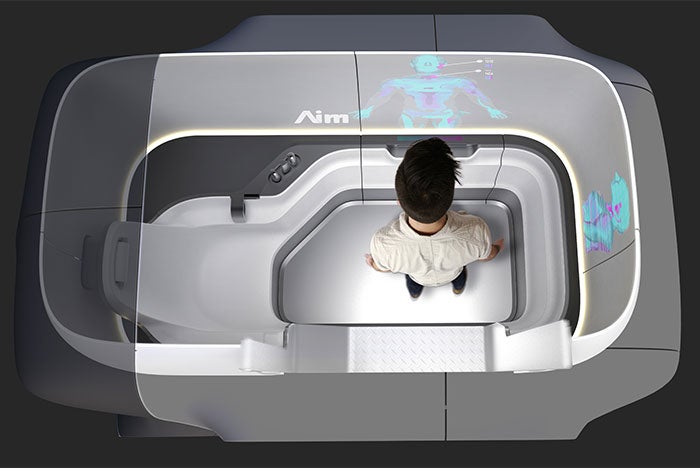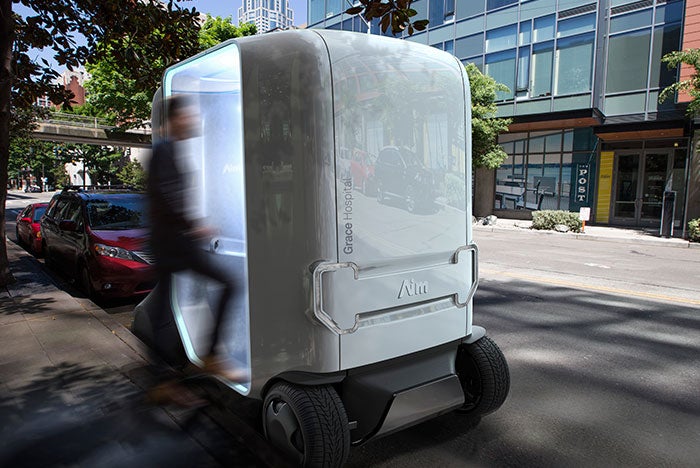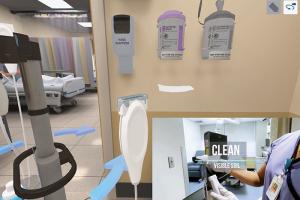Tech talk: mobile exam room, patient monitoring sensors and tele-ICU
Design firm aims higher with new mobile health care concept

Design firm Artefact created a new care concept called Aim, which includes a self-driving car that serves as mobile exam room with built-in smart technology.
Seattle-based design firm Artefact is elevating the idea of mobile health with a new concept. Its latest foray into the health care thought world is a project called Aim, which pushes the boundaries of the continuum of care. Rather than seeing health care as a destination, the concept integrates health into everyday life through wearables, smart sensors in a patient’s bathroom mirror, toothbrush and even toilet that can record key vital signs.
The crux of the concept, however, is its vision for self-driving cars acting as a remote doctor’s office on wheels. The car will include built-in technology like that of a doctor’s office. The floor will automatically weigh patients and measure body mass index and posture when they step inside. The chair’s acoustic sensors can hear respiration like a stethoscope, and a wraparound screen provides augmented reality interactions to guide the patient through the experience. It can facilitate telehealth appointments with actual doctors who will be fed patient information in real time and can even make and distribute prescriptions for some of the most common medicines.

Aim's self-driving car concept brings health care directly to the patient.
Artefact doesn’t have any plans to bring Aim into the market, but says that it hopes it serves as another catalyst as health care continues to evolve.
“Our vision for a scalable, holistic concept of health care service delivery gives patients autonomy, while helping care organizations successfully triage cases, manage the burden on the system and allocate resources effectively,” the design firm states.
Hospital uses bed sensors for continuous patient monitoring
St. Joseph Hospital, Nashua, N.H., recently expanded the use of its contact-free, continuous patient-monitoring solution. The 208-bed hospital initially installed the EarlySense system in its medical-surgical unit to address such patient safety concerns as earlier detection of patient deterioration, improved monitoring of acute care patients on opioids, and providing clinical decision support tools.
The EarlySense sensor, placed under the patient's bed mattress, continuously monitors heart and respiratory rates without any discomfort, contact or restrictions to the patient's movement. Nurses are notified via alerts on their pagers and at the central display station if there are potentially adverse changes in the patient's vital signs.
The solution also will help St. Joseph staff to keep track of patient movement in the bed to help reduce the risk of pressure ulcers and to assist patients who attempt to leave the bed. Each patient's monitor can be adjusted individually for personalized care and response time, while limiting false alarms.
VA hospital launches telehealth ICU program
The VA Northern Indiana Health Care System in Fort Wayne recently launched its intentisive care unit (ICU) telehealth program. Eight beds in the hospital’s ICU and emergency department will have tele-ICU capabilities, allowing medical personnel at the VA’s regional facility in Cincinnati to monitor high-risk patients and advise Fort Wayne’s doctors and nurses on care strategies.
The program is part of a multimillion-dollar project that included renovations of the hospital’s long-term care areas, according to the News-Sentinel.




